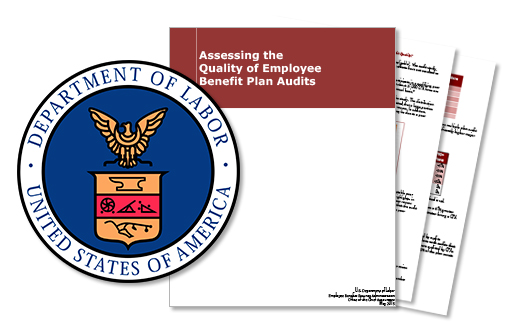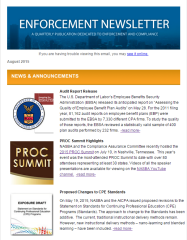Enforcement NewsletterAugust 2015The U.S. Department of Labor’s Employee Benefits Security Administration (EBSA) released its anticipated report on "Assessing the Quality of Employee Benefit Plan Audits" on May 28. For the 2011 filing year, 81,162 audit reports on employee benefit plans (EBP) were submitted to the EBSA by 7,330 different CPA firms. To study the quality of those reports, the EBSA reviewed a statistically valid sample of 400 plan audits performed by 232 firms. They found 61 percent of those audits fully complied with professional auditing standards or had only minor deficiencies. The other 39 percent contained major deficiencies with respect to one or more relevant GAAS requirements, which would lead to the rejection of a Form 5500 filing. The ESBA reports this put $653 billion and 22,500,000 plan participants and beneficiaries at risk. As ESBA studies conducted in 1988, 1997 and 2004 previously found, once again the smaller the firm’s employee benefit plan audit practice, the greater the incidence of audit deficiencies. The current study found CPAs often failed to consider the audit areas unique to employee benefit plans. However, the EBSA notes, firms that were members of the AICPA’s Employee Benefit Plan Audit Quality Center did tend to have fewer audits containing multiple GAAS deficiencies. "NASBA representatives have been meeting with the Employee Benefits Security Administration’s Chief Accountant, Ian Dingwall, and his staff, and we are pleased to see the recommendations contained in this report demonstrate the Department of Labor’s desire to work more closely with the State Boards, to bring them into the information loop in a timely way when substandard work is submitted by the Boards’ licensed firms," NASBA Executive Vice President Colleen K. Conrad observed. Since 2005, the DOL has made 507 routine referrals: 481 to the AICPA and 89 to the Boards. Regarding Audit Quality Referrals, the DOL has referred 145 matters: 132 to the AICPA and 13 to the Boards. Routinely over 65 percent of referrals to the AICPA conclude with issuance of a confidential RCA letter. Boards cannot take action in these matters because they are not included in the referral process and the confidentiality of the RCS letters precludes the AICPA from sharing the information with the Boards. NASBA continues to communicate with the DOL and AICPA to create relevant consent forms which can be signed by the licensee when the Boards open a complaint in order to allow the DOL and/or AICPA to share their investigative files with the Boards. In order to facilitate the referral process, NASBA is already working to compile an accurate listing of designated personnel at each Board to serve as the appropriate contact person for DOL and AICPA referrals. The report lists several recommendations involving State Boards for the ESBA to pursue: 1. "Work with the National Association of State Boards of Accountancy (NASBA) and the AICPA to improve the investigation and sanctioning process for those CPAs who perform significantly deficient audit work. Work with NASBA to get state boards of accountancy to accept the results of investigations performed by EBSA or the AICPA’s Professional Ethics division, in order to use those results in disciplining CPAs (at the state licensing level)." 2. "Work with NASBA to encourage state boards of accountancy to require specific licensing requirements for CPAs who perform employee benefit plan audits. This would include specific training and experience in the audits of employee benefit plans." 3. "Communicate with each of the state boards of accountancy (licensing boards) regarding the results of the study and the need to ensure that only competent CPAs are performing employee benefit plan audits." Other recommendations include: Amend the ERISA to allow the Secretary of Labor to establish accounting principles and audit standards, and set regulations concerning the qualification requirements for those accountants performing employee benefit plan audits; Work with the AICPA’s Peer Review staff to make Peer Review more responsive in helping to improve employee benefit plan audit quality; Amend the ERISA to repeal the limited-scope audit exemption; And continue and expand ESBA’s outreach activities. The full report can be read here. |
Full Newsletter |


